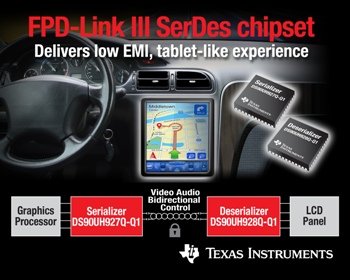Jul 4 2013
Texas Instruments (TI) expanded its FPD-Link III automotive-grade SerDes family today with the industry's most feature-rich chipset. The DS90UH927Q-Q1 serializer and DS90UH928Q-Q1 deserializer deliver uncompressed high-definition (HD) digital video and audio to touchscreen LCD panels in a vehicle's central information display and rear passenger seats.
 TI’s DS90UH927Q-Q1 serializer and DS90UH928Q-Q1 deserializer chipset delivers uncompressed high-definition (HD) digital video and audio to touchscreen LCD panels in a vehicle’s central information display and rear passenger seats.
TI’s DS90UH927Q-Q1 serializer and DS90UH928Q-Q1 deserializer chipset delivers uncompressed high-definition (HD) digital video and audio to touchscreen LCD panels in a vehicle’s central information display and rear passenger seats.
The DS90UH928Q-Q1 is the industry's only deserializer to offer automatic cable equalization, 24-bit color dithering, and white balancing over an LVDS connection. These features enable LCD panels to provide the highest performance, lowest cost, and lowest electromagnetic interference (EMI), compared to competitive solutions. For more information and to order samples, visit www.ti.com/ds90uh927q-q1-pr and www.ti.com/ds90uh928q-q1-pr.
The chipset supports high-bandwidth digital content protection (HDCP), and a direct connection to LVDS input sources and displays, including the OpenLDI (LVDS digital interface) standard. This reduces the number of signal lines by 68 percent and makes them differential to provide the lowest possible EMI. Compared to the competition, TI's FPD-Link family gives system architects a greater number of video sources and displays that can be directly connected to the automotive video network.
Key features and benefits of the DS90UH927Q-Q1 and DS90UH928Q-Q1:
- Color-rich, 720p tablet-like experience: 5-MHz to 85-MHz pixel clock and 24-bit pixel depth combine with on-chip white balancing, high frame rate control dithering, and 7.1 audio support to deliver high-quality video and sound. This provides a consistent look across all car models from entry-level sedans to luxury sport utility vehicles (SUVs). The dithering and white balancing feature at HD resolution also saves costs by allowing the use of lower quality LCD panels.
- Adaptive cable equalizer compensates for cable loss: DS90UB928Q-Q1 adapts automatically to the cable length and the condition or age of the cable. This unique feature addresses cable wear and tear that often occurs with drop-down or pop-up displays, and allows manufacturers to stock fewer LCD panel versions.
- Simple approach to content-protected video: Carries digital video, audio and bidirectional I2C control signals concurrently over a single twisted wire pair using the HDCP interface protocol. HDCP and encrypt/decrypt keys are implemented in the SerDes on-chip memory, simplifying system design. This eliminates the cost of microcontrollers and FPGAs that are required with packet-based, compressed video systems using an Ethernet interface.
The DS90UH927Q-Q1 and DS90UH928Q-Q1 can be mixed and matched with other members of TI's FPD-Link III family to address an entire range of car models. For example, the DS90UH928Q-Q1 deserializer can be combined with theDS90UH925Q-Q1 serializer, DRA74x "Jacinto 6" automotive processor, and DRV2667 piezo haptic driver for HD touchscreens, while the DS90UH927Q-Q1 serializer and DS90UH928Q-Q1 deserializer can be combined with the DRV2667 and other leading graphics processors to form a complete infotainment subsystem. Non-HDCP versions of these SerDes are also available as the DS90UB927Q-Q1 and DS90UB928Q-Q1.
Tools and support
Evaluation modules (EVMs) are available today to quickly evaluate both devices. Suggested retail pricing for the DS90UH927QEVM and DS90UH928QEVM is US$299, respectively. IBIS models for the DS90UH927Q-Q1 and DS90UH928Q-Q1 are also available.
Engineers designing with this chipset can ask questions and get answers from TI experts in the TI E2E™ Community High Speed Interface Forum.
Availability, packaging and pricing
The DS90UH927Q-Q1 serializer and DS90UH928Q-Q1 deserializer are available now, priced at US$9.75 each in 1,000-unit quantities. The DS90UH927Q-Q1 is in a 40-pin, 6-mm x 6-mm QFN package, while the DS90UH928Q-Q1 is in a 48-pin, 7-mm x 7-mm QFN package.